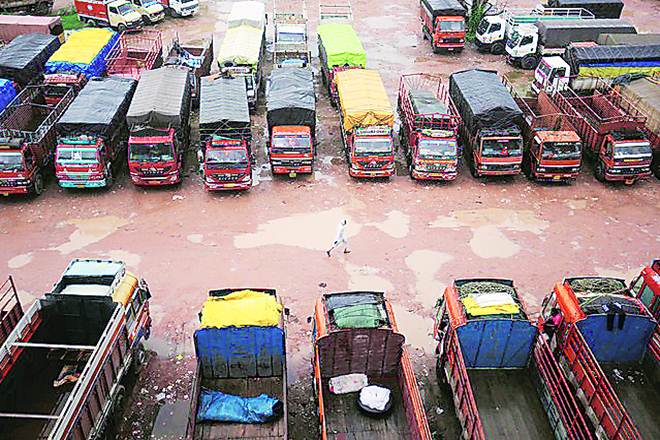The ongoing indefinite strike of transporters has cast a shadow on the $130-billion textile industry which is facing a staggering loss of up to Rs 1,500 crore.
If the strike continues, the industry will have to curtail production, and it will affect the fund flow, credibility and reputation on the export front as India is one of the largest exporters of garments and other textile products, said industry sources.
The knitwear export has been declining since October 2017, and in the second half of 2017-18, the decline was to the tune of 21% as compared to the corresponding period in 2016-17. In the first quarter of the current financial year (2018-19) also, the export has declined by 21% as compared to the same period in 2017-18, a data compiled by the industry said.
With the festive season fast approaching coupled with global order commitments by the exporters, the industry has not only lost a good amount of foreign exchange, but also will soon lose the market to competitors such as Indonesia, Bangladesh, Vietnam, Cambodia and the latest entrant Myanmar too, said Sanjay K Jain, chairman, Confederation of Indian Textile Industry (CITI).
“A staggering Rs 1,200 crore to Rs 1,500 crore export orders are lying idle due to transporters strike across the nation. In addition to this, there are hardly any movement on the domestic front,” he said.
The strike has affected the entire textile industry hitting its production, fund flow, employment, credibility and reputation. The impact of the strike is so huge that it has forced the units to suspend their production in the absence of no supply of raw material. Many units work on the basis of just-in-time arrival of raw material, and this strike would lead to loss of livelihood for lakhs of casual workers. Even regular workers would have to do with lower wages in the absence of production incentives and overtime, Jain said further.
According to Raja M Shanmugham, president, Tirupur Exporters’ Association (TEA), the largest knitwear/readymade garments cluster in India, “The on-going indefinite lorry strike has created a major impact on our exporting units as they could not transport finished garments for shipment through sea ports in Tuticorin, Chennai, Cochin and Mumbai or through airports of Chennai, Bengaluru, Mumbai and Cochin. The cascading effect would be severe on the exporting units and the delay in settling the issue would derail the exports and affect entire textile industry.”
He further said, “The season conscious and design-driven export market, the on-time supply is a major detrimental factor and any delay would not be cherished by the foreign buyers at a time when we are competing with advantageous countries such as Bangladesh, Cambodia, Myanmar, Sri Lanka, Pakistan, Vietnam and China in the international market.”
“On a daily basis, average export goods worth Rs 75 to Rs 100 crore are stagnating with the units and the inventory started piling up. In addition to this, goods worth close to Es 100 crore meant for domestic market could not be transported/supplied due to transporters’ strike,” Shanmugham said.
SK Rangarajan, president, South India Spinners’ Association, said: “The small spinning mills are facing the hardship for the last six days with a 25,000 tonne of yarn/threads worth `550 crore lying idle at the factory gates.” Simialrly, raw materials such as cotton, yarn and other products could not be brought to the mills, hence loss of jobs to temporary workers at the factory level, he added.
According to Sanjay Jain, if the strike continues, the industry may lose good amount of foreign exchange due to not fulfilling their export obligations. The delay in shipments would lead to LCs expiring, air shipment costs and cancellation of orders plus loss of reputation/credibility with foreign buyers. The industry is feared to lose thousands of crores through transaction due to this strike.

